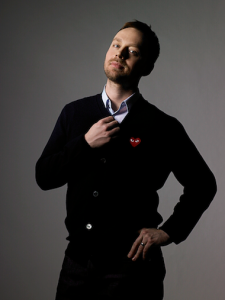Chances are good you’ve heard the voice of Darren Hayes, even if you don’t immediately recognize his name. Best known as the singing half of the popular Australian boy band Savage Garden, which scored a string of radio hits around the globe in the late 1990’s, Hayes has sold over 25 million records worldwide in the course of his decade-long career. In addition to Savage Garden’s eponymous 1997 debut and the duo’s second and final offering, Affirmation (1999), he has released three critically acclaimed solo albums: the retro-pop confection Spin (2002), a moodier techno-based outing titled The Tension and the Spark (2004), and a sweepingly ambitious new project, This Delicate Thing We’ve Made (2007).
This latest release is a powerful double CD in which Hayes plumbs the depths of his own history and hardscrabble youth through 25 eclectic, intricate songs. Hayes produced the album independently after amicably parting ways with Sony/Columbia Records, which had released his records up to that point. As he wryly sings in “On the Verge of Something Wonderful,” the album’s euphoric first single, “There’s a decent living to be made / in selling out of our deals.”
Born in a working-class suburb  of Brisbane in 1972, Hayes faced an upbringing with few creative outlets (a subject that he rarely addresses in his music), though 80’s pop had saved him in many ways. While he was married to a woman when Savage Garden first achieved international stardom, he publicly came out as gay in 2006 when he married graphic designer Richard Cullen. He and his husband stood at the front of the line to be legally partnered in the United Kingdom, second in fame only to Elton John and David Furnish. Hayes’ new album explores this period of transition in his life: “My heart was in the attic/ like the picture of Dorian Gray,/ I was rescued by the enemy/ that dared not speak its name.” With references to everything from Oscar Wilde to quantum physics, This Delicate Thing We’ve Made finds him poised to follow in the footsteps of gay pop icons like George Michael.
of Brisbane in 1972, Hayes faced an upbringing with few creative outlets (a subject that he rarely addresses in his music), though 80’s pop had saved him in many ways. While he was married to a woman when Savage Garden first achieved international stardom, he publicly came out as gay in 2006 when he married graphic designer Richard Cullen. He and his husband stood at the front of the line to be legally partnered in the United Kingdom, second in fame only to Elton John and David Furnish. Hayes’ new album explores this period of transition in his life: “My heart was in the attic/ like the picture of Dorian Gray,/ I was rescued by the enemy/ that dared not speak its name.” With references to everything from Oscar Wilde to quantum physics, This Delicate Thing We’ve Made finds him poised to follow in the footsteps of gay pop icons like George Michael.
I spoke by phone with Darren Hayes, who was at his home in the Notting Hill district of London just prior to leaving for his 2007 “Time Machine” concert tour.
Jason Roush: How do you feel about the place of gay artists in the current pop music scene?
Darren Hayes: Actually, I don’t think sexuality matters at all. I don’t see myself as someone who makes gay music. I’m a 35-year-old man. I have blue eyes, I like Star Wars, and I have a gap between my two front teeth. My point is, being gay is just one characteristic of my DNA. For me, the focus has always been on the music first, not my eligibility as someone on People magazine’s “Most Beautiful” list. If the focus is on art, and not the image, I think sexuality is even less important.
JR: How did coming out publicly last year when you married your partner Richard affect your personal life, your career, and your music?
DH: The main difference has been the way I feel about myself. My self-esteem skyrocketed because I felt so accepted and loved. Getting married was the decision I made, rather than to come out. To me, I met the man I want to grow old with, and I wanted my audience to know that I was proud of that, not ashamed.
JR: How have you navigated over time the level of celebrity that you’ve experienced? Do the negative aspects of celebrity ever outweigh the positive ones for you?
DH: I honestly despise “celebrity” culture. Most of my heroes are not celebrities—people like Annie Lennox, Kate Bush, or Peter Gabriel. These are musical artists who have notoriety, not just fame. These days there’s such an obsession with fame, and I just refuse to sell myself off for that kind of attention. In those ways, I don’t think I’ve experienced too many negative aspects, really. There’s been the odd attempt to drag me into the tabloids, or when someone has tried to take advantage of me because of my job. But in general I keep my head down and work hard.
JR: In the press release for your latest CD, you mention that until you met your husband, “the 80’s were the last time I was really happy.” Do you feel that being gay and less open about it during your Savage Garden years contributed to that unhappiness?
DH: Well, no. I wasn’t an open book, but I never lied about it. In fact, no one ever asked me, “Are you gay?” My sadness had little to do with my job and more to do with my own internalized homophobia. I hated who I was, and mostly I was ashamed. Ashamed of my childhood, ashamed of being gay. It made me hate myself, and therefore my world was a sad place, regardless of number one hits.
JR: This Delicate Thing We’ve Made is a soul-baring record in so many ways. What compelled you to explore with such candor the difficult childhood memories to which you’ve returned in a number of these songs, especially the epic journey of “How to Build a Time Machine” and “Casey”?
DH: Honestly, it was a healing process for me. I made my peace with my past in song. I loved that I could take something so tragic and use it for something beautiful and transformative. I also thought it would be inspiring to tell the story of a family and a person who survived the experience instead of being overwhelmed by it.
JR: Your ambitious new project is one of the few CDs I’ve heard that actually earns the right to be a “double.” Why did you decide to make your new album a two-disc, 25-song extravaganza, rather than a standard-length pop offering?
DH: It was the music and the story that designated the size. I wanted to make a concept album, and I needed the space that a double-album gives in order to do justice to the tale. In many ways it was the story of my life, and I didn’t want to compromise it by editing it down.
JR: How did you arrive at the varied palette of sounds that the album incorporates, from orchestral arrangements to acoustic guitar to techno beats?
DH: Again, it came from the concept. I was immersed in Victorian-era science fiction by authors like Jules Verne and H. G. Wells, and therefore the suggestion was one of theatrics, cinema, and ultimately the sound of a musical. The concept really demanded an orchestral base, and then I could sprinkle technology and poetry over the top.
JR: Was it a liberating experience to produce your new CD independently? Did your songwriting and recording processes differ from previous projects?
DH: No, actually. I’m lucky that I’ve always had free rein when it came to the creative process. However, the biggest change was that there was no room full of cynical men in suits to give criticisms and spout forth sales figures and the results of focus groups!
JR: Why did the idea of time travel appeal to you as a thematic motif?
DH: I had a dream in which I woke up my age, but it was 1983. I was obsessed with the idea that I could have a “to do” list of things to change about my youth, and essentially things that I’d make right—apologies and such. So that was the central idea of the album. Then of course there was the Kate Bush album Hounds of Love, and the fact that I’d bought the very same model of Fairlight synthesizer that she’d used to make that album. The synthesizer felt like my time machine.
Jason Roush, author of After Hours and Breezeway, teaches at Emerson College.




